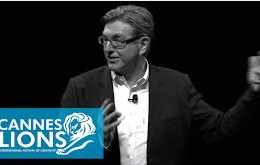 When Keith Weed, Unilever’s chief marketing officer speaks about the future of brands, everyone listens – as was apparent at the packed house at Cannes Lions 2016.
When Keith Weed, Unilever’s chief marketing officer speaks about the future of brands, everyone listens – as was apparent at the packed house at Cannes Lions 2016.
Wearing a bright green jacket, Weed shared his formula for the future of brands in a world of exponential growth and continued disruption.
His formula was simple – I raised to the power of n. Here I stood for:
•Individuals
•Influencers
•Impact
Raise them to the power of n, and you have the magic formula.
“Marketing is about engaging with individuals,” he said. “Technology has allowed us to move from mass to massive customization” The CMO today has become the Chief Macro officer and the Chief Micro officer. They have to engage people globally and locally. “When you combine both, that’s where the magic is.”
Giving the example of Axe, Weed showed the typical Axe ad which has been viewed by 76 million people. In addition to this, they are also customizing ads to target individuals. He showcased an ad for Axe in Brazil called Romeo Reboot. This film has 1, 00,000 versions. “This film which got a 170 per cent increase in tension, showed that if you show stuff that people are interested in, they watch it for longer.”
Targeting the right Influencers is the next I. Celebrities, experts, thought leaders and social maven need to be targeted and roped in to help further the brand. He gave the example of the launch of Magnum Double, where they got Kendall Jenner to magnify it on Twitter. “If you use influencers on Twitter, there’s a 5.2x increase in engagement.”
Identification and use of power users in categories, and topics people are discussing about also helps. He gave the example of the ‘Dirt is Good’ campaign, where the famous educationalist, Sir Ken Robinson advocated the brand with a video message stating, that children weren’t spending enough time playing in the open. “Kids are spending less time outdoors than a prison inmate” was a revelation.
The last I to focus on is Impact. “Purpose driven business is good for governments and businesses.” Giving the example of Unilever brands, he said, “Brands with purpose moved faster than brands without one. Their business grew 30 % faster than the rest of the business.”
“54 % consumers will buy a product if it is socially and environmentally sustainable; Our Unilever brands that did this grew faster in 2016 than they did in 2014.” Here he gave the examples of the Ben and Jerry’s campaign for deforestation.
“Brands can have impact by breaking stereotypes” he said giving the example of the Dove campaign for real beauty where they portray authentic and not aspirational women. “Making progressive ads is economic and not just a moral decision. Progressive ads from the company had an impact of 12 per cent more than normal ads.”
Weed urged the attendees to build brands in the new way. “In the past few years consumers have been ahead of marketers. Now is a time for a renaissance in marketing.”

